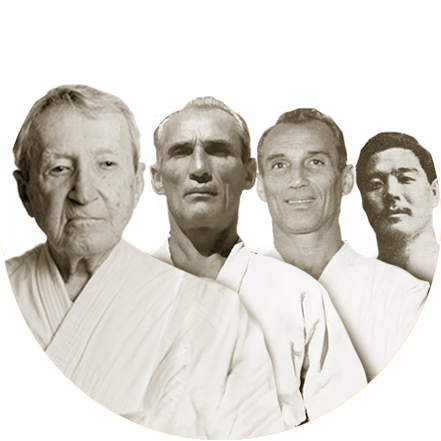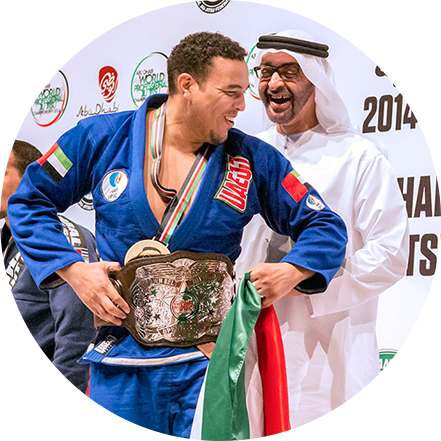JIU-JITSU AND ITS PHILOSOPHY
The sport of Jiu-Jitsu is based upon two main pillars:
-
Activating the mind and body to be able to use the energy of the opponent and use it for your benefit as much as possible.
-
Reliance on defenseless combat, which contributes to rising fitness levels.

HISTORY AND ORIGINS
Ancient India is considered the birthplace of jiu-jitsu with Buddhist monks adopting the sport to help balance and strength, and negate the advantage provided by weapons prevalent at the time. The growth of the sport progressed to Japan and China where it attracted attention and a growing number of practitioners Jiu-Jitsu at its core maintains its non-violent identity with jiu-jitsu meaning ‘gentle art’ in Japanese. In addition to its many physical benefits, jiu-jitsu focusses on other core values like loyalty, fairness, humility, self-confidence, and respect. In 1915 jiu-jitsu started to earn widespread recognition, when moving to Brazil, Japanese jiu-jitsu practitioner Mitsuyo Maeda hosted exhibitions, which ultimately planted the roots for jiu-jitsu in the Americas, beginning by training the local community in the sport. One of Maeda’s eager students was Carlos Gracie, who opened his own academy in 1925, kickstarting a greater spread of the sport, passing down the art of jiu-jitsu to his children and future generations, with the family name eventually becoming synonymous with jiu-jitsu in Brazil and the sport of jiu-jitsu steadily has come to be an important component in the lifestyles of the Brazilians.JIU-JITSU IN UAE

In the UAE His Highness Sheikh Tahnoon Bin Zayed Al Nahyan is the spiritual father of the sport and deserves
credit for the sport’s rapid rise.
In 1995, while studying in San Diego in the US,
His Highness gained an interest in jiu-jitsu being one of the core foundations of the increasingly popular mixed martial arts scene,
HH Sheikh Tahnoon joined the Gracie Barra Academy to gain insight into and
understand the basics of the sport and its guiding principles.
HH Sheikh Tahnoon also became the first person from the UAE and the greater Arab world to earn a black belt in the sport.
Following his return to the UAE in 1997, HH Sheikh Tahnoon was determined to popularize the sport in the Emirates,
placing great value on the significant mental, physical, and social benefits that the sport propagated.
Jiu-jitsu in the UAE received a major boost when His Highness Sheikh Mohammed bin Zayed Al Nahyan,
President of the UAE, a committed supporter,
designated it the national sport of the UAE, aligning jiu-jitsu with Abu Dhabi’s goal to foster a health-conscious
society thanks to the sport’s many mental, physical, and societal benefits.
Courtesy of this strong support enjoyed by the sport of jiu-jitsu domestically,
the UAE has become an important destination on the global jiu-jitsu map and is one of the most influential
countries in the course of the development of the sport globally.
Abu Dhabi has gradually become known internationally as the home of jiu-jitsu,
being home to the headquarters of both the Asian and the international federations of the sport.
BENEFITS
Physical Benefits
-
Improves flexibility, balance, and physical strength
-
Helps maintain an appropriate weight
-
Improves the functioning of the cardiovascular system
-
Strengthens the immune system
-
Improves quality of sleep
Mental and Emotional Benefits
-
Promotes self-confidence and courage
-
Improves attention span, concentration, and reflexes
-
Reduces stress levels and improves general mood
Social Benefits
-
Promotes development of qualities like wisdom and humility
-
Establishes cooperative values and fosters team spirit
-
Stimulates positive thinking and encourages practitioner to keep an open mind
-
Encourages practitioner to increase knowledge of different cultures and civilizations
BELT SYSTEM

White belt
Age requirement: No age requirement Technical Level: The practitioner begins to learn the basics of jiu-jitsu and acquire basic skills
Grey belt
Age requirement: Practitioner should be between 4 to 15 years Technical Level: The practitioner has taken the next step in mastering the art of jiu-jitsu
Yellow belt
Age requirement: Practitioner should be between 7 to 15 years Technical Level: The practitioner acquires a set of skills that allows him to challenge for higher belts
Orange belt
Age requirement: Practitioner should be between 10 to 15 years Technical Level: The practitioner acquires increasing skills and experience
Green belt
Age requirement: Practitioner should be between 13 to 15 years Technical Level: Practitioner should have sufficient technical knowledge
Blue belt
Age requirement: Practitioner must be at least 16 years old Technical Level: Practitioner possesses considerable technical knowledge
Purple belt
Age requirement: Practitioner must be at least 16 years old Technical Level: The first step towards the intermediate adult level
Brown belt
Age requirement: The athlete is required to be at least 18 years of age Technical Level: Second highest belt in jiu-jitsu where the practitioner has honed his skills and technique